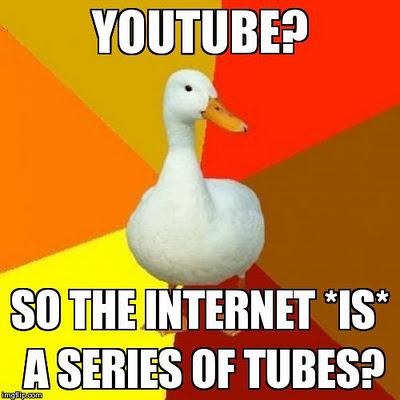Rose is the new Black...or not
I recently came across a question on the Internet that I found very interesting. To paraphrase: Why did Rebecca Black become so much more viral of an Internet phenomenon as a bad singer (supposedly; remember some people do like her) than Jenna Rose (whom I had never heard of until a few days ago), CathyMay15, or Final Placement, any of which are arguably far worse than Rebecca Black?
I suspect it may have to do with a combination of several factors: Rebecca Black is bad, but not quite so abysmally awful that she's unwatchable; the lyrics of "Friday" are really, really stupid; the WTF/LOL reaction to the appearance of the considerably older  rapper who appears in Rebecca's video (Jenna had a semi-random rapper in her video, but he was another kid, at least); the fact that Justin Bieber and Katy Perry took notice of Rebecca; and really the most important factor that I think plays a part in the formation of every meme, a random chance snowballing effect of popularity.
rapper who appears in Rebecca's video (Jenna had a semi-random rapper in her video, but he was another kid, at least); the fact that Justin Bieber and Katy Perry took notice of Rebecca; and really the most important factor that I think plays a part in the formation of every meme, a random chance snowballing effect of popularity.
That last one is the wild card that makes all the difference, I think. There are no doubt hundreds of bad singers on YouTube, but for one to become a viral sensation, I think they need to not know they are bad, and yet somehow attract viewers that will share the video link effectively.
On top of that, the "meme community" (that is to say, the people on the Internet who are the ones sharing links effectively; not really a cohesive, united community) will usually reject a new meme that's too similar to an existing one, and while Jenna's video was posted to YouTube first, Rebecca's was discovered first, consigning Jenna to be simply "another Rebecca Black". This is why I feel safe to venture a prediction that there will never be a "bad singer" memetically bigger than Rebecca Black, just like every attempt to brand some random video blogging girl on YouTube as "the new Boxxy!" always fails.
Here are some interesting graphs. Rebecca Black's video was posted to YouTube on February 10th, 2011, and started going viral March 11, 2011. Google Trends shows this growth in March for searches on "Rebecca Black":
The Jenna Rose video was uploaded to YouTube on October 1, 2010, but apparently pretty much nobody heard of her until about two days after Rebecca Black started going viral:
Furthermore, although CathyMay15 had videos on YouTube over a year before Rebecca Black came on the scene, her KnowYourMeme.com entry notes, "At least one interesting thread was spotted on 4chan on March 16, 2011, and her YouTube account was taken down the next day on March 17, 2011." So despite CathyMay15 being happy to stagnate in obscurity for over a year, (1) Rebecca Black appears, (2) somebody somewhere says, "You think Rebecca Black is bad? You should see this!" (3) CathyMay15 realizes she's being ridiculed and takes down her videos, but (4) it's too late and her videos are mirrored by others and she rises on the same tidal wave of popularity that's carrying Rebecca Black:
Nonetheless, it's clear these separately-trending singers are only receiving secondary attention as a comparison to Rebecca Black. There may be other bad singers/songs that got a "Rebecca Black bump" in popularity, and for that matter, this may be a phenomenon that happens with other types of memes, but I'm going to save that for another day's research and wrap this up.
When Richard Dawkins coined the term "meme", he did it with some comparison to biological evolutionary principles. I think there are some parallels in this analogy that haven't been explored as much as they could be, and this latter point of mine is one of them. Just as in biological evolution where a species will seek out and dominate a certain ecological niche and drive out competitors, memes similarly live in a sort of informational ecology. Once a particular meme occupies and dominates a certain niche of the Internet, it tends to block the growth of any others that would try to take the same space.
Notice that there may be tons of "Advice Dog spin-offs", but each one needs a specialized personality to survive. "Technologically Impaired Duck" may not be a huge meme, but it's prominent enough that we'll never see a "Technologically Impaired Goldfish" or a "Technologically Impaired Jackrabbit" take hold as a successful meme. And by a quirk of timing, every bad singer (female, at least) on the Internet will probably be referred to as "the next/latest Rebecca Black" for the foreseeable future.


